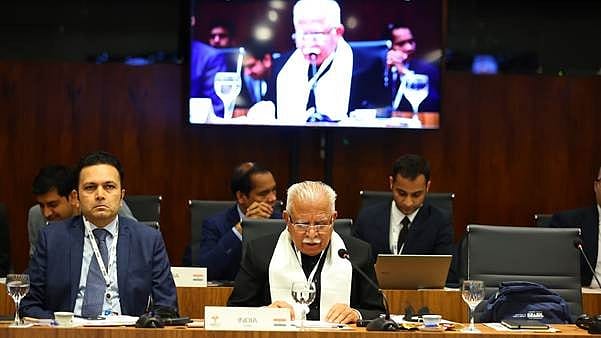India leads call for inclusive energy governance at BRICS ministers’ meet
ADVERTISEMENT

Union Minister for Power and Housing and Urban Affairs Manohar Lal, who led the Indian delegation at the BRICS Energy Ministers’ Meeting in Brasília, highlighted energy security as one of the most pressing current challenges and emphasised the need to strengthen BRICS cooperation to ensure economic stability and sustainability, as well as to promote equitable access to energy resources globally.
The Union minister reaffirmed India’s unwavering commitment to building a sustainable and inclusive energy future and lauded Brazil’s leadership under the theme, 'Strengthening Global South Cooperation for More Inclusive and Sustainable Governance.' He further emphasised the critical role of energy security, access, and affordability in advancing global development goals.
Lal showcased India’s rapid progress in clean energy, highlighting some of the key achievements such as a 90% increase in electricity capacity over the past decade, reaching 475 gigawatt (GW) in 2025 and targeting 900 GW by 2032.
India is investing in smart grids, advanced metering infrastructure, and an expanded transmission network, including the green energy corridor, the Union minister said. India is also setting ambitious goals for green hydrogen and nuclear energy, including a 100 gigawatt nuclear capacity target by 2047, he added.
The Union minister emphasised the role of the Global Biofuels Alliance in advancing cooperation in the biofuels sector and underscored India’s commitment to energy efficiency through innovative programmes such as the Energy Conservation Sustainable Buildings Code, rooftop solar initiatives, and efficient appliance standards.
He also underscored the vital role of fossil fuels in the global energy mix—especially for developing countries—and urged greater cooperation to promote their cleaner and efficient use through technologies such as coal gasification, carbon capture and storage, and green chemical innovations.
The BRICS Energy Ministers reaffirmed their commitment to strengthening energy security and advancing UN Sustainable Development Goal 7 (SDG 7), focusing on universal electricity access, clean cooking, and tackling energy poverty. They emphasised the need for just, inclusive, and balanced energy transitions in response to climate change.
While acknowledging the continued role of fossil fuels—particularly in developing countries—they stressed the importance of reducing greenhouse gas emissions in alignment with SDG 7 and global climate targets guided by technological neutrality and the principle of common but differentiated responsibilities and respective capabilities.
The ministers called for stronger partnerships, supported open, fair, and non-discriminatory international energy markets, and encouraged the use of local currencies in energy trade.
Affirming each country's right to determine its own energy transition path and pace, the ministers advocated efficient use of all energy sources and called for increased concessional and low-cost financing from developed to developing nations. They highlighted the role of the New Development Bank (NDB) in promoting sustainable energy infrastructure, especially through local currency financing.
The ministers advocated for adoption of fair, transparent, and consistent guidelines for assessing carbon intensity, energy classification, and mutual recognition of taxonomies and certifications.